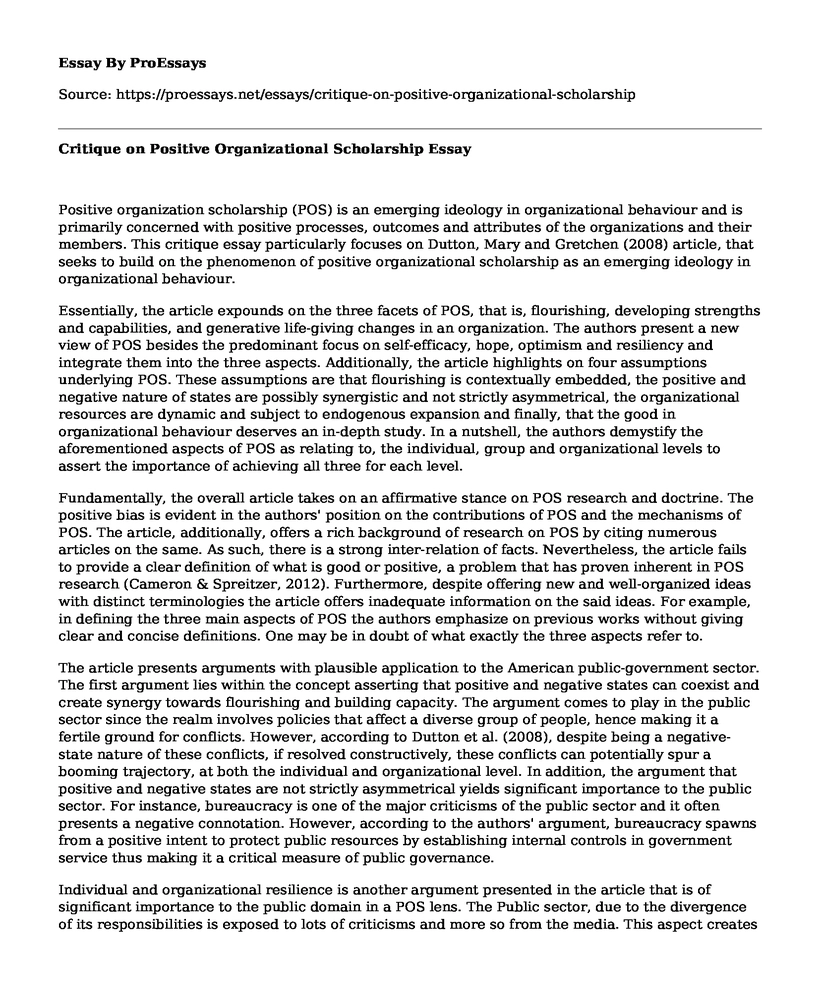Positive organization scholarship (POS) is an emerging ideology in organizational behaviour and is primarily concerned with positive processes, outcomes and attributes of the organizations and their members. This critique essay particularly focuses on Dutton, Mary and Gretchen (2008) article, that seeks to build on the phenomenon of positive organizational scholarship as an emerging ideology in organizational behaviour.
Essentially, the article expounds on the three facets of POS, that is, flourishing, developing strengths and capabilities, and generative life-giving changes in an organization. The authors present a new view of POS besides the predominant focus on self-efficacy, hope, optimism and resiliency and integrate them into the three aspects. Additionally, the article highlights on four assumptions underlying POS. These assumptions are that flourishing is contextually embedded, the positive and negative nature of states are possibly synergistic and not strictly asymmetrical, the organizational resources are dynamic and subject to endogenous expansion and finally, that the good in organizational behaviour deserves an in-depth study. In a nutshell, the authors demystify the aforementioned aspects of POS as relating to, the individual, group and organizational levels to assert the importance of achieving all three for each level.
Fundamentally, the overall article takes on an affirmative stance on POS research and doctrine. The positive bias is evident in the authors' position on the contributions of POS and the mechanisms of POS. The article, additionally, offers a rich background of research on POS by citing numerous articles on the same. As such, there is a strong inter-relation of facts. Nevertheless, the article fails to provide a clear definition of what is good or positive, a problem that has proven inherent in POS research (Cameron & Spreitzer, 2012). Furthermore, despite offering new and well-organized ideas with distinct terminologies the article offers inadequate information on the said ideas. For example, in defining the three main aspects of POS the authors emphasize on previous works without giving clear and concise definitions. One may be in doubt of what exactly the three aspects refer to.
The article presents arguments with plausible application to the American public-government sector. The first argument lies within the concept asserting that positive and negative states can coexist and create synergy towards flourishing and building capacity. The argument comes to play in the public sector since the realm involves policies that affect a diverse group of people, hence making it a fertile ground for conflicts. However, according to Dutton et al. (2008), despite being a negative-state nature of these conflicts, if resolved constructively, these conflicts can potentially spur a booming trajectory, at both the individual and organizational level. In addition, the argument that positive and negative states are not strictly asymmetrical yields significant importance to the public sector. For instance, bureaucracy is one of the major criticisms of the public sector and it often presents a negative connotation. However, according to the authors' argument, bureaucracy spawns from a positive intent to protect public resources by establishing internal controls in government service thus making it a critical measure of public governance.
Individual and organizational resilience is another argument presented in the article that is of significant importance to the public domain in a POS lens. The Public sector, due to the divergence of its responsibilities is exposed to lots of criticisms and more so from the media. This aspect creates potential threats to the morale and motivation of public servants as their work is constantly under attack. Given that most active hours are spent at work, public servants can then build resilience by navigating the said challenges. Such resilience can thereafter be applied to other aspects of one's life. Organizational resilience is fundamental to the Public sector since its services are needed not only in times of crises but also in day to day operations. Therefore, those tasked with providing such services need to maintain high quality levels regardless of any external animosity. As such, employing a POS perspective would go a long way in creating the much-needed organizational resilience in the public sector.
References
Cameron, K., & Spreitzer, G. (2012). The Oxford handbook of positive organizational scholarship. New York: Oxford University Press.
Dutton, J. E., Glynn, M. A., & Spreitzer, G. (2008). Positive organizational scholarship. The SAGE handbook of organizational behaviour, 1, 693-712.
Cite this page
Critique on Positive Organizational Scholarship. (2022, Feb 17). Retrieved from https://proessays.net/essays/critique-on-positive-organizational-scholarship
If you are the original author of this essay and no longer wish to have it published on the ProEssays website, please click below to request its removal:
- Experience of MBA and Final Project
- Article Analysis Essay on What's Wrong with Black English
- Research Paper on AI Innovation and Project Management in Atos
- What Leaders Really Do - Essay Sample
- Role of Play in Growth and Development of Preschoolers Essay
- Research Paper on Ethical Organizational Culture
- Gaining a Competitive Advantage: How Businesses Make Money Selling Goods and Services - Essay Sample







